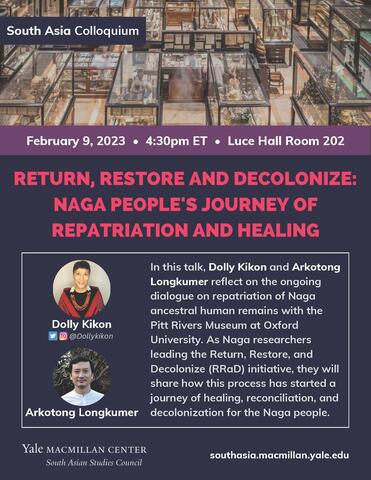Event time:
Thursday, February 9, 2023 - 4:30pm
Location:
Online via Zoom, and Luce Hall 202 (34 Hillhouse Avenue)
Event description:
The Pitt Rivers Museum at Oxford University houses the largest collection of Naga material culture in the world (6,466 items) including Naga ancestral human remains. In 2020, Naga researchers, cultural associations, and elders came together to initiate a dialogue on repatriation. In partnership with the Pitt Rivers Museum, the Naga team focused on the repatriation of approximately 213 Naga ancestral human remains back to the Naga homeland. The British Empire started administering the Naga Hills around 1832 to protect the tea trade in Assam. By the late 19th century, Christian missionaries started a process of conversion. This period witnessed British military raids, expeditions, and punitive punishments across the Naga Hills. For the British administration, the violence was termed as taming and civilizing the barbaric Naga people. Historically, this period marked the circulation of Naga images and artifacts across
British museums and private collections. The Naga people became symbols of savagery and exoticism that shaped the imagination of the North Eastern Frontiers in British India. Today, the legacy of British colonialism in the Naga Hills is inherited by the Pitt Rivers Museum at Oxford University, the Cambridge University Museum of Archeology and Anthropology, the Horniman Museum, and approximately 50 other museums that house Naga collections in Britain.
In this talk, Dolly Kikon and Arkotong Longkumer reflect on the ongoing dialogue on the repatriation of Naga human remains with the Pitt Rivers Museum at Oxford University. As Naga researchers leading the Return, Restore, and Deconize(RRaD) initiative, they will share how this process has started a journey of healing, reconciliation, and decolonization for the Naga people.
The event is in a hybrid format. The Zoom link coming soon.
Admission:
Free
Open to:
General Public
